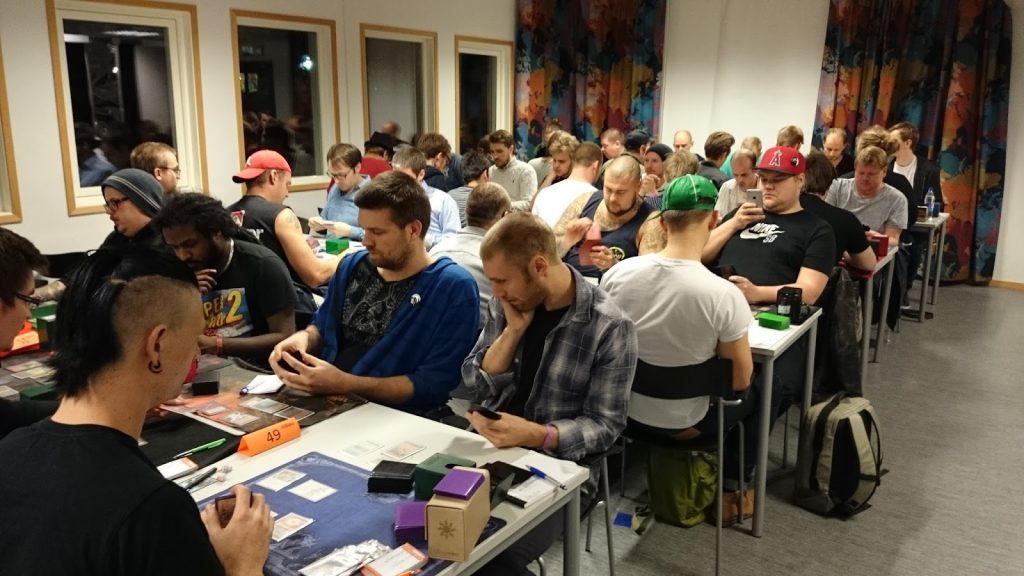Crossing the Bridge to Magic: The Gathering
“I should have used contract bridge strategy to plan my next play.” ~ Mike Pustilnik
By Alex J. Coyne © 2018 Great Bridge Links
Card playing enthusiasts are often proficient at more than one card game. Are you normally a bridge player with a side-love for playing blackjack and Yu-Gi-Oh!, or are you a die-hard poker fan who sits down to play Magic: The Gathering every once in a while? It’s easy to see the attraction between trick-taking and trading card games. We took a look at some champion bridge players who are also experts at Magic: The Gathering.
Paulo Vitor Damo de Rosa
Paul Vitor Damo de Rosa, or just Paulo Vitor for short, was born in Brazil in 1987, and is currently one of the most notable Magic: The Gathering players to ever enter the game – and one of the most successful. He is the youngest player to reach 300 Lifetime Pro Points in 2011, and he was elected to the Magic: The Gathering Hall of Fame in 2012. Yes, he’s a serious professional.
You can find him on Twitter at @PVDDR. His profile describes him as a “casual bridge player”, and if his strategy at Magic: The Gathering is anything to go by then we’re sure he’d give any player a good run!
Mike Elliott
Mike Elliott is a prolific game designer, best known for his work on games like Magic: The Gathering, Dice Masters, Thunderstone and Battle Spirits: The TCG. (He’s worked on tons of others, too, including being the head developer of trading card games like the X-Men and Star Wars.)
Of course, he’s not just a game designer, but also plays the games he works on. Now, we don’t know all that much about his bridge playing except for rumors whispered on message boards and this: His Magic: The Gathering profile answer to the question How did you get your job here: “Recruited at a convention by Joel Mick, former VP of brand. Got into Magic through several friends I used to play tournament Bridge with.”
His profile is available here, or you can browse through his MTG articles archive. He’s also available on Twitter @elliott_games.
Mike Pustilnik
Michael Pustilnik is another trading card player worth taking note of. Just to give you a small scope of his career, he took home the winning title at the 2001 MTG Pro Tour held in Los Angeles, and has two “Pro Tour Top Eight” titles to his name. In 2001, he also took top spot at a MTG Masters Tournament in New Orleans.
According to his Magic: The Gathering wiki page, his winnings have amounted to approximately $100, 475 at last count in 2017 – we’re pretty impressed!
He readily admits the benefit of contract bridge strategy when playing trading card games in his Grand Prix: Milwaukee Report from 2002, in which he took 24th place:
“I should have used contract bridge strategy to plan my next play: Figure out what cards the opponent might have, and play so as to dodge any bullets that can be dodged. If Benafel actually has a Counterspell, I cannot win, but I could have – and should have – played around Gainsay. I played a land and cast Psychatog; it got Gainsayed, and the match was drawn.”
Seth Manfield
Seth Manfield earned two Grand Prix wins (within 30 days of each other), two Pro Tour Top 8s, and a World Championship title—all in just over a year and a half. Seth’s friend and fellow MTG player, Alex Majlaton notes in an article on the Magic site:
“It’s hard for me to say that nobody else can develop this skill, but I think it came very naturally for Seth from his experience playing tournament bridge—a game where you can’t succeed without deducing what your opponents and teammate have in their hands.”
Seth learned from one of the best – his father, Ed Manfield, was a World Champion and professional bridge player who won a Silver and then Gold in the Rosenblum Cup.
Photo Source: oldschool-mtg.blogspot.ca





